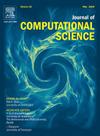Data-driven robust optimization in the face of large-scale datasets: An incremental learning approach
IF 3.1
3区 计算机科学
Q2 COMPUTER SCIENCE, INTERDISCIPLINARY APPLICATIONS
引用次数: 0
Abstract
One of the most significant current discussions in optimization under deep uncertainty is integrating machine learning and data science into robust optimization, which has led to the emergence of a new field called Data-Driven Robust Optimization (DDRO). When creating data-driven uncertainty sets, it considers a dataset’s complexity, hidden information, and inherent form. One of the more practical machine learning algorithms for creating data-driven uncertainty sets is support vector clustering (SVC). This algorithm has no prerequisites for preliminary information to generate uncertainty sets with arbitrary geometry. More scenarios can reduce risk when developing SVC-based uncertainty sets. However, the lack of a systematic way to manage the large number of these scenarios hinders the employment of SVC. This paper puts forward an incremental learning algorithm based on support vector clustering, called Incremental Support Vector Clustering (ISVC), to construct an uncertainty set incrementally and efficiently using large datasets. This approach’s novelty and main contributions include incrementally constructing uncertainty sets and dynamic management of outliers. In order to update the temporarily stored Bounded Support Vectors (BSV) and identify outliers, the idea of BSV-archive is offered, where the revision-and-recycle operation is tailored to do just that. As a result, some of the newly acquired information is preserved. Experiments on large-scale datasets demonstrate that the proposed ISVC approach can create an uncertainty set comparable to that of an SVC-based method while using significantly less time.
面对大规模数据集的数据驱动稳健优化:增量学习法
在深度不确定性条件下的优化方面,当前最重要的讨论之一是将机器学习和数据科学整合到稳健优化中,这导致了一个名为数据驱动稳健优化(DDRO)的新领域的出现。在创建数据驱动的不确定性集时,它要考虑数据集的复杂性、隐藏信息和固有形式。支持向量聚类(SVC)是用于创建数据驱动不确定性集的较为实用的机器学习算法之一。这种算法对初步信息没有先决条件,可以生成任意几何形状的不确定集合。在开发基于 SVC 的不确定性集时,更多的场景可以降低风险。然而,由于缺乏系统的方法来管理这些大量的情景,SVC 的应用受到了阻碍。本文提出了一种基于支持向量聚类的增量学习算法,称为增量支持向量聚类(ISVC),利用大型数据集增量、高效地构建不确定度集。这种方法的新颖性和主要贡献包括增量构建不确定集和动态管理异常值。为了更新临时存储的有界支持向量(BSV)并识别离群值,我们提出了 BSV 存档的想法,其中的修订和循环操作正是为实现这一目的而量身定制的。因此,一些新获取的信息得以保留。在大规模数据集上进行的实验表明,所提出的 ISVC 方法可以创建一个与基于 SVC 方法相当的不确定性集,而所用时间却大大减少。
本文章由计算机程序翻译,如有差异,请以英文原文为准。
求助全文
约1分钟内获得全文
求助全文
来源期刊

Journal of Computational Science
COMPUTER SCIENCE, INTERDISCIPLINARY APPLICATIONS-COMPUTER SCIENCE, THEORY & METHODS
CiteScore
5.50
自引率
3.00%
发文量
227
审稿时长
41 days
期刊介绍:
Computational Science is a rapidly growing multi- and interdisciplinary field that uses advanced computing and data analysis to understand and solve complex problems. It has reached a level of predictive capability that now firmly complements the traditional pillars of experimentation and theory.
The recent advances in experimental techniques such as detectors, on-line sensor networks and high-resolution imaging techniques, have opened up new windows into physical and biological processes at many levels of detail. The resulting data explosion allows for detailed data driven modeling and simulation.
This new discipline in science combines computational thinking, modern computational methods, devices and collateral technologies to address problems far beyond the scope of traditional numerical methods.
Computational science typically unifies three distinct elements:
• Modeling, Algorithms and Simulations (e.g. numerical and non-numerical, discrete and continuous);
• Software developed to solve science (e.g., biological, physical, and social), engineering, medicine, and humanities problems;
• Computer and information science that develops and optimizes the advanced system hardware, software, networking, and data management components (e.g. problem solving environments).
 求助内容:
求助内容: 应助结果提醒方式:
应助结果提醒方式:


